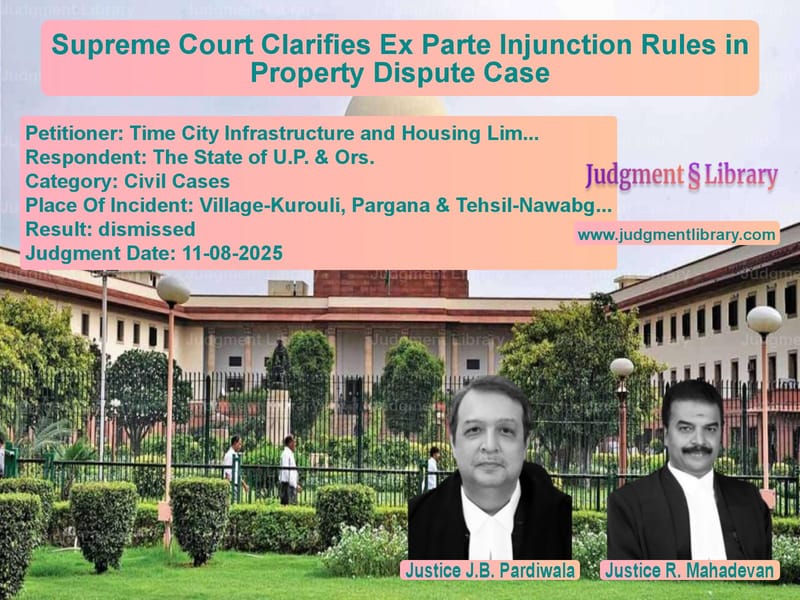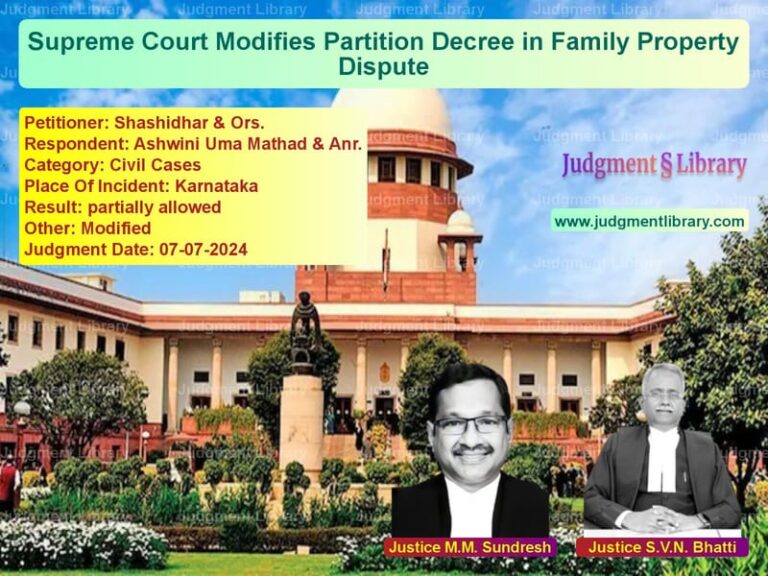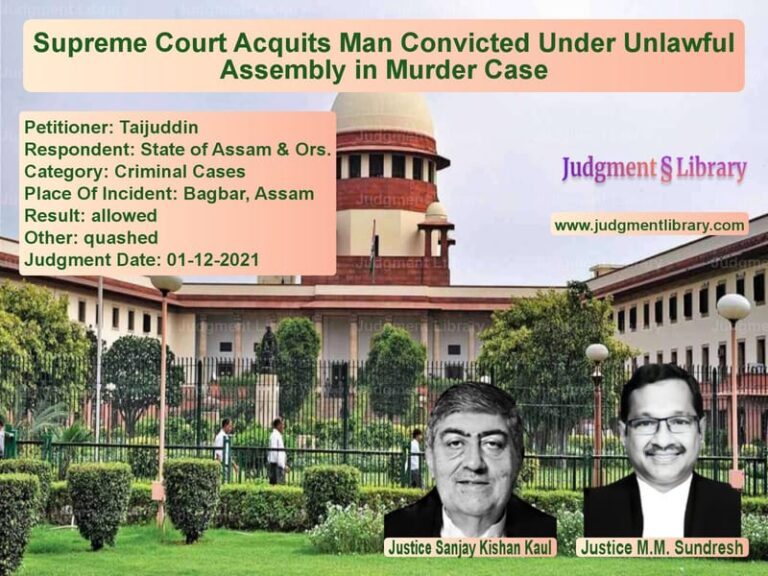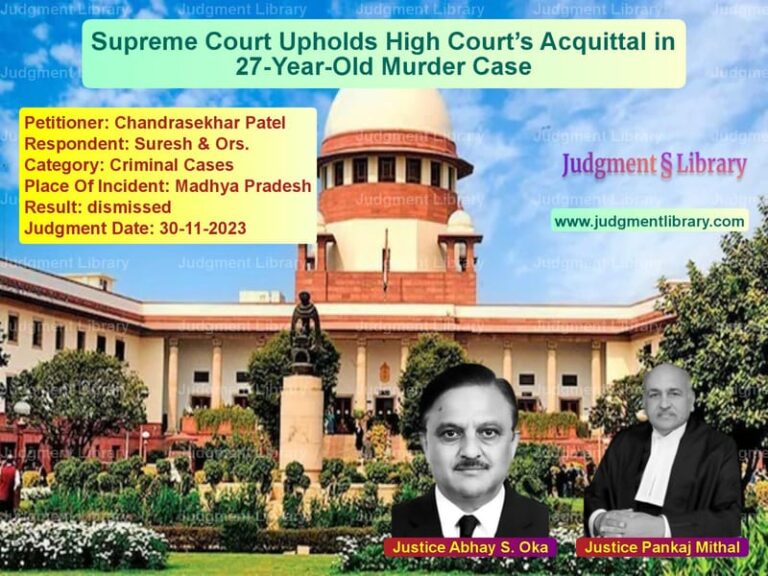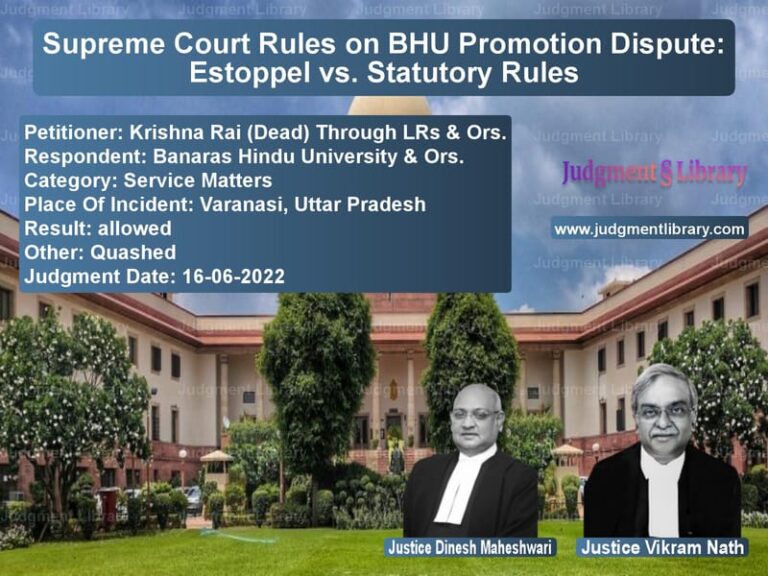Supreme Court Clarifies Ex Parte Injunction Rules in Property Dispute Case
In a significant ruling that clarifies the legal requirements for obtaining ex parte injunctions in property disputes, the Supreme Court of India has provided important guidance on when courts can grant restraining orders without hearing the other side. The case involved Time City Infrastructure and Housing Limited, a Lucknow-based company, and the State of Uttar Pradesh, centering around a contentious property dispute in Barabanki district.
The legal battle began when Time City Infrastructure filed a civil suit claiming ownership and possession of several land parcels totaling 0.985 hectares in Village Kurouli, Tehsil Nawabganj, District Barabanki. The company alleged that they had entered into an agreement to sell on March 21, 2015, made full payment of Rs. 3,60,12,782 to the defendants, and taken physical possession of the land. They claimed to have developed the land with roads and constructed two offices, merging it with their adjoining plotting sites.
The Trial Court’s Ex Parte Order
On May 9, 2025, the Civil Judge (Senior Division) granted an ex parte injunction in favor of Time City Infrastructure, directing both parties to maintain status quo on the title and possession of the suit property. The trial court’s order stated: “Thus, prima facie the case is made out by the plaintiff. In the light of the facts and circumstances and for the protection of the suit property/land and in order to prevent further litigation, Parties should maintain the status quo in the interest of justice.”
The court went further to appoint a Local Commissioner to inspect the property and prepare a detailed report including boundaries, measurements, and existing constructions. This ex parte order was granted without giving notice to the opposite party, which became the central issue in the subsequent legal challenges.
The High Court’s Intervention
The State of Uttar Pradesh, dissatisfied with the ex parte injunction, approached the Allahabad High Court under Article 227 of the Constitution, which gives High Courts supervisory jurisdiction over subordinate courts. The High Court took a strong view of the matter and set aside the trial court’s order.
In its scathing observations, the High Court noted: “From the plaint and the agreement to sell which has been placed, it is evident that the entire suit is nothing but a legal jugglery.” The court pointed out that the agreement to sell was executed in 2015 with a one-year performance period, but no suit for specific performance had been filed within the limitation period.
The High Court further criticized the trial court’s approach, stating: “The trial Court has passed the order in a cursory manner, the trial Court has not considered the suit in its entirety. It has not even recorded any existence of a prima-facie case, the balance of convenience or irreparable hardship – the three sine qua non for grant of mandatory injunction.”
In a significant administrative direction, the High Court ordered the transfer of the case to another court and directed the Senior Registrar to place a copy of the order before the Administrative Judge of Barabanki district for potential administrative action against the trial judge.
The Supreme Court’s Legal Analysis
Time City Infrastructure then approached the Supreme Court, challenging the High Court’s order. The Supreme Court bench comprising Justices J.B. Pardiwala and R. Mahadevan delved into the legal provisions governing ex parte injunctions, particularly Order 39 Rule 3 of the Code of Civil Procedure.
The court examined the statutory framework, noting that Order 39 Rule 3 states: “The Court shall in all cases, except where it appears that the object of granting the injunction would be defeated by the delay, before granting an injunction, direct notice of the application for the same to be given to the opposite party.”
The proviso to this rule allows for ex parte injunctions but imposes strict conditions. The Supreme Court emphasized: “Conferment of this privilege on the party seeking an injunction is accompanied by an obligation cast on the court to record reasons for its opinion and an obligation cast on the applicant to comply with the requirements of Clauses (a) and (b) of the proviso. Both the provisions are mandatory.”
Key Precedent on Ex Parte Injunctions
The Supreme Court relied heavily on its landmark judgment in Shiv Kumar Chadha v. MCD (1993), which established the mandatory nature of the requirements for ex parte injunctions. Quoting from this precedent, the court noted: “The imperative nature of the proviso has to be judged in the context of Rule 3 of Order 39 of the Code… The requirement for recording the reasons for grant of ex parte injunction cannot be held to be a mere formality.”
The court further elaborated on the principles established in Shiv Kumar Chadha: “The party which invokes the jurisdiction of the court for grant of an order of restraint against a party, without affording an opportunity to him of being heard, must satisfy the court about the gravity of the situation and court has to consider briefly these factors in the ex parte order.”
Emphasizing the mandatory nature of these requirements, the Supreme Court quoted: “If it is held that the compliance with the proviso aforesaid is optional and not obligatory, then the proviso by the Parliament shall be a futile exercise and that part of Rule 3 will be a surplusage for all practical purposes.”
The Consequences of Non-Compliance
The Supreme Court laid down clear guidelines for situations where there is non-compliance with the mandatory requirements of Order 39 Rule 3: “We are of the opinion that if the court is satisfied of non-compliance by the applicant with the provisions contained in the proviso then on being so satisfied the court which was persuaded to grant an ex parte ad interim injunction confiding in the applicant that having been shown indulgence by the court he would comply with the requirements of the proviso, it would simply vacate the ex parte order of injunction without expressing any opinion of the merits of the case.”
The court explained the rationale behind this strict approach: “The applicant would be told that by his conduct he has deprived the opponent of an opportunity of having an early or urgent hearing on merits and, therefore, the ex parte order of injunction cannot be allowed to operate any more.”
Practical Resolution and Directions
Despite identifying the legal infirmities in the ex parte injunction, the Supreme Court took a practical approach given that the trial court was scheduled to hear both parties on the injunction application the very next day. The court decided not to interfere with the High Court’s order but provided important directions.
The Supreme Court directed: “The Trial Court shall hear the plaintiff and defendants and decide the injunction application filed by the plaintiff on its own merits in accordance with law, without being influenced in any manner by any of the observations made by the High Court in its impugned order.”
This direction ensured that the case would be decided on merits while protecting the rights of both parties to be heard, thus balancing the procedural requirements with substantive justice.
Broader Implications for Property Litigation
This judgment has significant implications for property litigation across India. It reinforces that ex parte injunctions are exceptional remedies to be granted only when strictly necessary and in compliance with all procedural requirements. The ruling serves as a reminder to lower courts to exercise caution while granting injunctions without hearing the other side.
The Supreme Court’s emphasis on the mandatory nature of recording reasons for granting ex parte injunctions ensures transparency and accountability in judicial proceedings. This prevents the misuse of injunction powers that could otherwise cause irreparable harm to property rights.
Furthermore, the judgment highlights the importance of the three essential conditions for granting injunctions: prima facie case, balance of convenience, and irreparable injury. Courts must properly evaluate these factors rather than granting injunctions as a matter of routine.
Conclusion
The Supreme Court’s ruling in Time City Infrastructure vs State of UP represents a significant reinforcement of procedural safeguards in property disputes. By emphasizing the mandatory nature of Order 39 Rule 3 requirements, the court has protected the fundamental principle of audi alteram partem – hear the other side – which is essential to natural justice.
While the court disposed of the special leave petition without interfering with the High Court’s order, it ensured that both parties would get a proper hearing on the injunction application. This balanced approach maintains the integrity of judicial process while ensuring that substantive rights are properly adjudicated.
The judgment serves as an important precedent for all courts dealing with ex parte injunctions, particularly in property matters where rights and interests are often substantial and permanent in nature. It reinforces that procedural requirements are not mere technicalities but essential safeguards that protect the rights of all parties in judicial proceedings.
Petitioner Name: Time City Infrastructure and Housing Limited Lucknow.Respondent Name: The State of U.P. & Ors..Judgment By: Justice J.B. Pardiwala, Justice R. Mahadevan.Place Of Incident: Village-Kurouli, Pargana & Tehsil-Nawabganj, Dist-Barabanki, Uttar Pradesh.Judgment Date: 11-08-2025.Result: dismissed.
Don’t miss out on the full details! Download the complete judgment in PDF format below and gain valuable insights instantly!
Download Judgment: time-city-infrastruc-vs-the-state-of-u.p.-&-supreme-court-of-india-judgment-dated-11-08-2025.pdf
Directly Download Judgment: Directly download this Judgment
See all petitions in Property Disputes
See all petitions in Contract Disputes
See all petitions in Specific Performance
See all petitions in Damages and Compensation
See all petitions in Civil Defamation
See all petitions in Judgment by J.B. Pardiwala
See all petitions in Judgment by R. Mahadevan
See all petitions in dismissed
See all petitions in supreme court of India judgments August 2025
See all petitions in 2025 judgments
See all posts in Civil Cases Category
See all allowed petitions in Civil Cases Category
See all Dismissed petitions in Civil Cases Category
See all partially allowed petitions in Civil Cases Category

